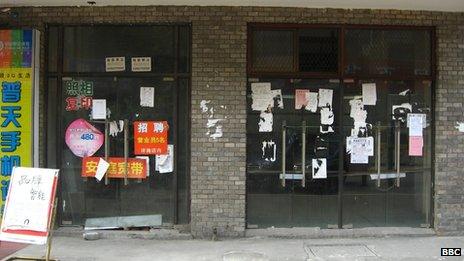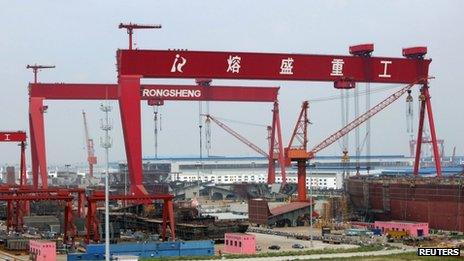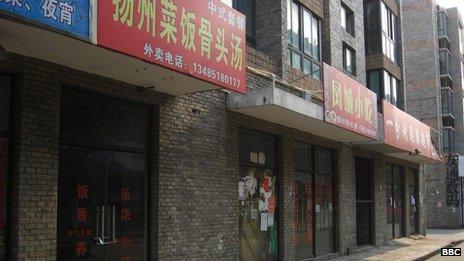Charting the effect of China's cooldown
- Published
John Sudworth reports on China's economic slowdown
Since it opened in 2006, Rongsheng shipyard on China's eastern coast has always been a symbol of the country's economy.
First, as a monument to China's rising industrial power fuelled by a huge investment boom - a glut of lending and spending on an ever-increasing scale poured into buildings, bridges, homes and industry.
Rongsheng was part of that boom. It is one of China's biggest shipyards, opened in 2006, and its huge gantries and cranes are capable of building some of the world's biggest ships.
A decade ago, from almost nothing, China declared that it wanted to be the biggest shipbuilding nation in the world by 2015.
But today Rongsheng is a symbol in another, much less welcome sense.
Much of the yard is idle and 20,000 workers have been laid off over the past two years.
Ghost town
There is simply not enough global demand for new ships and, as in other industries in which China has over-invested, there is huge overcapacity, a total of 1,647 shipyards.

Changqingsha, a town built up around Rongsheng shipyard, is now desolate
The town of Changqingsha that has been built up around Rongsheng is now a ghost town, a far cry from the usual image of China's bumper, breakneck economic growth that we've grown used to.
One of the main shopping streets, just a short walk from the shipyard gates, is a desolate picture of decline.
Shop after shop, on both sides of the road, is closed and padlocked with "space for rent" signs plastered on the doors and windows.
The few shopkeepers that have stayed are struggling on bravely, hoping to make enough to at least cover the rental payments until their leases expire.
So are some of the restaurant owners, trying to cater for the 7,000 or so workers who still have jobs, down from the peak of 28,000 two years ago.
Government help
"We all know that Rongsheng lacks money," one worker tells me. "If the government can help, it would be a good thing."
Indeed, Rongsheng, which is not a state-owned company but is listed on the Hong Kong stock exchange, has appealed for government help to save it, on top of the many millions of US dollars of public funds it has already received.
In fact, so tight is the relationship between bureaucrat and businessman here, that when we asked the Rongsheng press office for an interview and permission to film, they told us they would need to clear the request with the local Communist Party Propaganda Office.
The answer was no.
It is important to remember, of course, even here in Changqingsha, that China's economy is still motoring along, certainly by Western standards, with economic growth for 2012 coming in at 7.8%.

Rongsheng Shipyard has appealed for government help
But the point is that the rate of growth is slowing, and even more to the point, China's policymakers actually want it that way.
Or at least, they know it is unavoidable.
An economy based on ever-increasing investment is simply unsustainable, as China's shipbuilding industry starkly illustrates, so the new government has set itself the priority of rebalancing the growth model.
The cooldown
Future growth is meant to come from a much more sustainable source: increases in consumer spending.
So the years of double-digit economic expansion are now long gone and the great cooldown has begun.
The only question is, how hard and how fast?
The target for this year is officially 7.5%, but some are wondering if it has been quietly downgraded again, following comments from Finance Minister Lou Jiwei last week, who appeared to suggest he would now be happy with 7%.
If they get the rebalancing right, then China's economy will have been saved from its inherent structural stresses and the new government can concentrate on delivering its so-called "China Dream".

Changqingsha is feeling the effect of China's attempt to rebalance the economy
But there are huge risks, beginning to show perhaps for the first time, in places like Changqingsha.
"It's hopeless," one of the few surviving shopkeepers tells me. "There's no dream here."
Until now, China has depended on booming economic growth to ensure social stability. Is it really ready to stop the big spending?
Rongsheng may be a test of the government's true intentions, a gauge of how swift a transition it is trying to engineer.
Some analysts suggest that it is inevitable that for a shipyard of this size, there will be a reprieve, another tranche of the kind of bailout money the government is trying to wean this economy off.
But there is a chance that it will prefer instead to send a signal that the much-trailed, big and painful shift in China's GDP model is now well and truly under way.
- Published15 July 2013